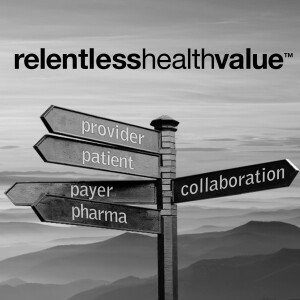EP254: How to Achieve Outcomes That Matter to Patients, With Nadine Jackson McCleary, MD, MPH, BSN
 2020-01-02
2020-01-02
Everybody knows about evidence-based medicine, especially evidence-based medicine around the use of pharmaceuticals—and especially in oncology. Provider and payer organizations, many of them, strive to standardize care pathways around that evidence-based medicine. Here is the thing: I’ve heard it said that doctors and patients at the point of care are not particularly interested in evidence-based medicine. What they want right then is medicine-based evidence: If this patient takes this medicine, what will the outcome be?
Is there a name for this medicine-based evidence? Why, yes there is! It’s otherwise known as patient-reported outcomes, or PROs. And the high demand for meaningful PRO data has been clear across the spectrum of stakeholders but especially when it comes to patients and doctors who are actually making treatment decisions. This demand is really acute for oncology patients and their doctors, where the stakes are high and adverse events are definitely not trivial.
PROs can be collected for drugs that are already FDA approved but also for drugs in development. It’s been said that a Pharma these days who skips collecting PROs in cancer drug development does so at its own peril.
Here’s something that Dr. Ethan Basch said. He said, “When I sit down with a patient to think about starting a new treatment, almost invariably the first question that they ask is how they will feel with this product.” Dr. Ethan Basch, by the way, I interviewed in EP157. He’s the director of the Cancer Outcomes Research program at the University of North Carolina.
In that interview, you can hear about how Dr. Basch and his colleagues found that by collecting patient-reported outcomes and acting on them, patient survival time improved something like 5 months. So put this in perspective: Those drugs that cost hundreds of thousands of dollars that are coming out … they don’t increase survival time that long.
Let’s bring this full circle. How is all of this relevant to evidence-based medicine? It’s relevant because all of those evidence-based pathways that we’re working on these days should lead to not “better patient outcomes.” They should lead to the outcomes that matter for this patient. And what matters is not some kind of universal truth. Patients at different points in their lives with different goals are going to have different ideas of what good looks like to them. We all know that what gets measured gets managed. So, if achieving patient outcomes or being patient-centric is the goal here and we’re not measuring PROs, then we’re not managing them either.
In this health care podcast, I speak with Nadine Jackson McCleary, MD, MPH, BSN. Dr. McCleary is an oncologist at Dana-Farber Institute and an assistant professor in medicine at Harvard Medical School. She is currently working on a project to collect patient-reported outcomes and make them actionable. I interviewed Dr. McCleary at the NODE Digital Medicine Conference in New York City recently.
You can learn more by connecting with Dr. McCleary on Twitter at @DrNJMcCleary.Nadine Jackson McCleary, MD, MPH, BSN, is an assistant professor of medicine at Harvard Medical School, senior physician of the Dana-Farber Cancer Institute (DFCI), and medical director for the DFCI Patient-Reported Data Program in the department of informatics and analytics. As an active member of the Gastrointestinal Cancer Center, she specializes in gastrointestinal oncology with a unique clinical focus on those at the extremes of age (younger than 20 and older than 80). She serves as the liaison for the Gastrointestinal Cancer Center to the DFCI satellite and collaborative members.
More Episodes
Create your
podcast in
minutes
- Full-featured podcast site
- Unlimited storage and bandwidth
- Comprehensive podcast stats
- Distribute to Apple Podcasts, Spotify, and more
- Make money with your podcast
It is Free
- Privacy Policy
- Cookie Policy
- Terms of Use
- Consent Preferences
- Copyright © 2015-2024 Podbean.com






